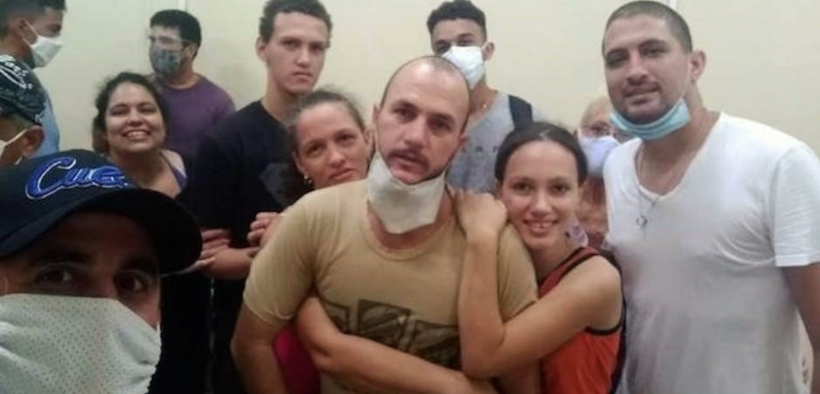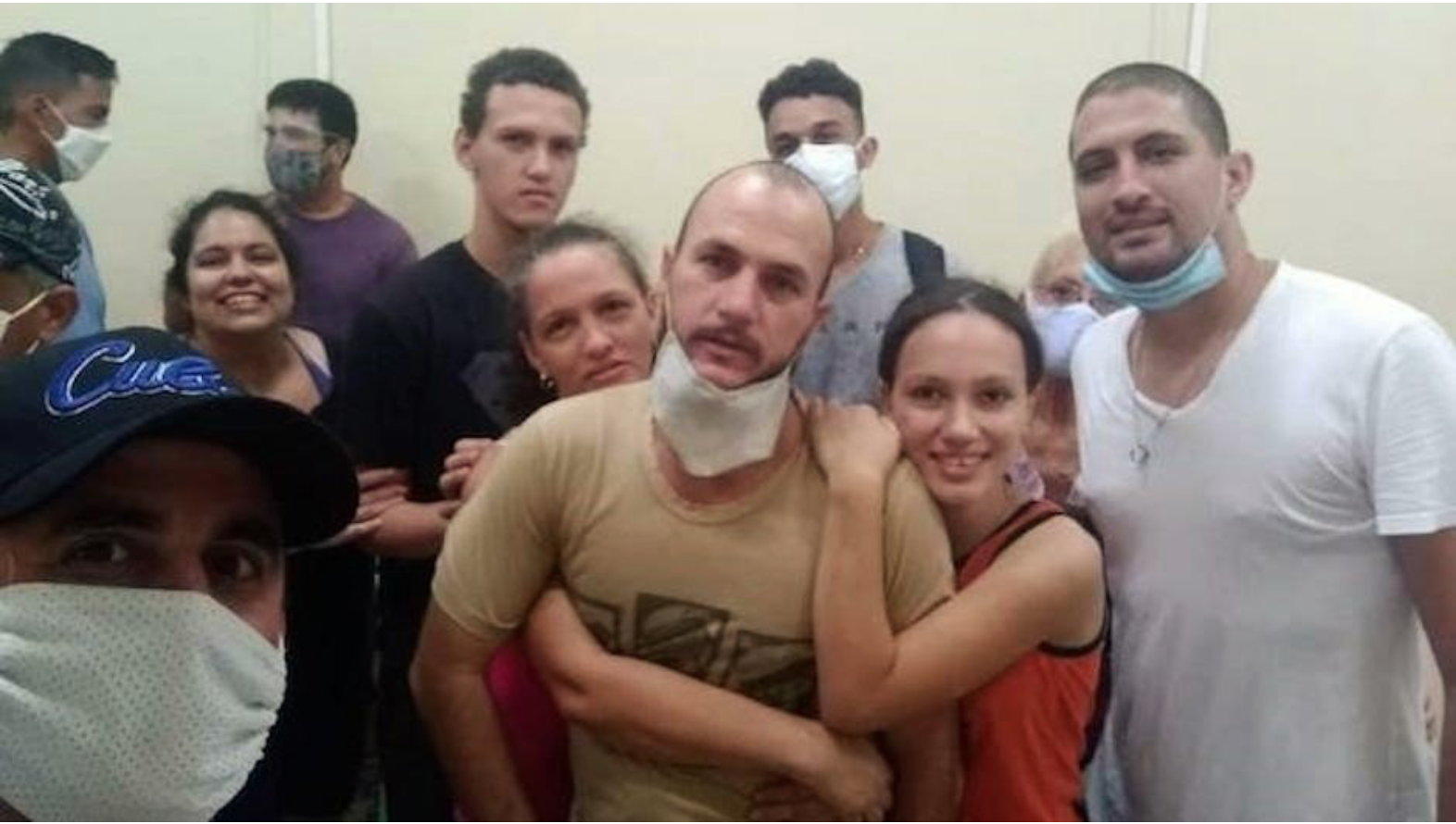Protestants Are Now Cuba’s Most Repressed Religious Group, Tally Finds

This story was first published by Diario de Cuba and Cubanet and translated into English by Evangelical Focus with permission. It was also published by Religion UnPlugged, and reprinted here with permission. The second part will be published soon.

On July 11, 2021, in Cuba, thousands of people of all kinds took to the streets with various demands. It was the greatest display of the power of civil society ever seen in this totalitarian country, where the socialist state tries to control its citizens as much as possible.
It is impossible to know exactly who the demonstrators were, but some of them are part of the growing community of evangelical and Protestant Christians who, according to a 2015 survey, represent around 7% of the population.
Methodist pastor Carlos Macias was stuck with two dilemmas in that day of large anti-system demonstrations in Cuba. The first was related to his vocation: “To be a pastor of a historic denomination like the Methodist Church, under the stigma that Christians do not participate in politics, and at the same time to want to exercise my civil rights and freedoms as a citizen,” he said in an interview.
The other dilemma was “between the need to express (himself) and make use of freedom of thought” and “the fear of the consequences that this could have on a personal level.” In another time, the pastor might have opted for self-censorship, for staying at home as so many Cubans have always done. But that July 11, 2021, known as “11J,” something seemed to change.
Access to MinistryWatch content is free. However, we hope you will support our work with your prayers and financial gifts. To make a donation, click here.
In the battered streets of Jovellanos, Matanzas Province, a crowd chanted for freedom. The same was happening in more than 60 other places all over the country. Macias and his eldest son left their house church to join in. He understands that as a religious leader, it is not his mission to call for a protest. But as a believer, of course, he recognizes “the right to participate in a demonstration demanding justice.”
Growing tension
Tensions between some of the leaders of the evangelical community and the state have increased over the past three years. Since 2018, the main Protestant churches have been demanding more independence from state organizations that try to control them or do not recognize them as having legal status.
The main Protestant churches have strongly rejected Cuban government mandates, such as the Comprehensive Sexuality Education Program, with its focus on gender, sexual and reproductive rights, and the promotion of same-sex marriage. Protestants have demanded the right to live and educate their children according to their religious principles and beliefs.
Although clashes with the state and acts of punishment or intimidation of these churches have multiplied since then, they had not escalated to the point where a large number of pastors were imprisoned for days, weeks or months—until 11J came along.
On that day, Macias and other Protestant leaders who had never before taken to the streets to protest did so. They joined thousands of other citizens who were also demonstrating for the first time. And this time, the religious leaders weren’t just demonstrating for religious freedom—they joined as part of a population demanding food and medicine and, above all, shouting, “Freedom!”
Since then, state persecution of Protestant pastors has continued and contributed to an increasing number of religious leaders and churches questioning police repression or speaking out against the government.
Protestants were, in fact, the religious group with the most leaders repressed as a result of 11J, according to a tally by the group Justicia 11J, which compiles an inventory of the arrests and legal proceedings being suffered by those who demonstrated on that day.
Subsequently, in late August, another community leader who had been openly critical of the regime and shared images of the 11J protests on social media was also captured and prosecuted.
In all these cases, the pastors were not detained as part of larger groups. Either the authorities were waiting for them in their homes or churches, or they were taken from the crowd.
Although they all went out as individuals, without inciting their congregations to demonstrate, they received the same treatment as other civil society leaders or more overtly political opponents: arrest and criminal prosecution.
“The government views religious groups as the largest independent civil society sector and fears their potential to mobilize large groups of people,” said a source inside Christian Solidarity Worldwide, an international organization that promotes religious freedom. They asked not to be identified because of CSW’s work in Cuba.
“The involvement of believers and some religious leaders in the 11J protests fed the government’s paranoia,” the source added. “The government wants exemplary cases to show other religious leaders what the consequences will be if they don’t follow the rules.”
The case of Carlos Macias
Macias recalled how on that day, “everyone said what they wanted to say—basically despair and disagreement with what is happening.
“Many people, almost 1,500 people of different ages, began to walk peacefully through the streets of Jovellanos,” he explained in a video shared on social media.
According to his testimony, in the protest, “there was no violence on the part of the demonstrators.” However, that did not prevent “a group of Cuban government sympathizers and plainclothes officers” from entering the rally to try to arrest him and his son.
“They insulted us, blasphemed us and called us dogs,” the pastor said. “They were trying to destabilize us mentally. They were looking for strife.”
Macias recalled that someone in the middle of the crowd shouted, “They want to take the pastor away!”
Then, “part of the people intervened and thwarted the arrest. That’s when we understood that we had to get out of the chaos that was emerging in the place and return with my wife and my youngest son.”
After Macias returned, the church house was guarded by members of the Interior Ministry. Macias was warned that if he left, he would be imprisoned. He was under house arrest without charge.
Macias had previously spoken out against abuses of the state through teachings and social media posts. When San Isidro Movement artist Luis Manuel Otero Alcantara went on hunger strike in April 2021, he expressed his solidarity on social media. So it was natural for him to take to the streets on 11J.
In a video on his Facebook account, Alcantara said, “Today I had the honor of participating in a spontaneous demonstration. I want to say that no one here was paid a penny to participate.
“Diaz-Canel, a president I did not elect, in the framework of these demonstrations called for bloodshed, for confrontation, and he will be responsible for every drop of blood of Cubans who are wounded or die in the attempt.
“The time has come to speak out, which is dangerous because we live in a dictatorship. But I don’t think we can stand it any longer. In Cuba we have dignified Cubans who are not willing to keep silent to please a family (The Castros).”
His motivation, according to himself, was not due to “political or ideological reasons,” but “Biblical, theological and doctrinal principles related to freedom and truth.”
Imprisoned in his house, Macias lived the hours as if inside a large drop of amber. The heat and the uncertainty of what would happen to him and his family slowed down time, he said.
Meanwhile, Ricardo Pereira, a Methodist bishop, contacted the authorities in person to lobby for Macias’ release. After two days in detention, the pastor was summoned to the Jovellanos police station. Several plainclothes and uniformed officers threatened him with reprisals if he demonstrated publicly again, and the house arrest was lifted.
A few days later, the board of directors of the Methodist Church published a statement on the church’s social networks with unusually direct language critical of the government. In it, the church said it rejected “the repressive manner used against the demonstrating population.”
“Cuba ought to be a free and sovereign country, where all their children are respected, both those who support the revolution, as those who do not sympathize with the sociopolitical system,” the church said.
Other large churches issued similar statements. The Pentecostal Assemblies of God directly questioned Diaz Canel, blaming him for the violence that occurred on 11J.
“A government that proclaims the inclusion of all citizens must have the wisdom to promote dialogue and not confrontation,” the statement said. “We believe that slogans devoid of peace and sanity will not resolve the situation in which the country finds itself, but rather destine the nation to total chaos and destruction.”
Yoé Suárez graduated as a journalist from Havana University in 2014 and is the author of the nonfiction books “La Otra Isla” (International Book Latino Award 2019, translated to Italian), “Charles en el Mosaico” (Mention at Casa de las Americas Prize 2018), “El Soplo del Demonio. Violencia y Pandillerismo en La Habana” (2018) and ”Leviatan. Policía Política y Terror Socialista en Cuba” (Iliada Award 2021). Suárez was the correspondent of the TV channel CBN News in Havana for three years and has reported investigative journalism for Diario de Cuba since 2018. He also published in Newsweek, El Espanol, Univision and El Espectador. Suárez won the Gabo Scholarship of Cultural Journalism in 2018 and completed a degree in journalism at Eafit University in Colombia.



